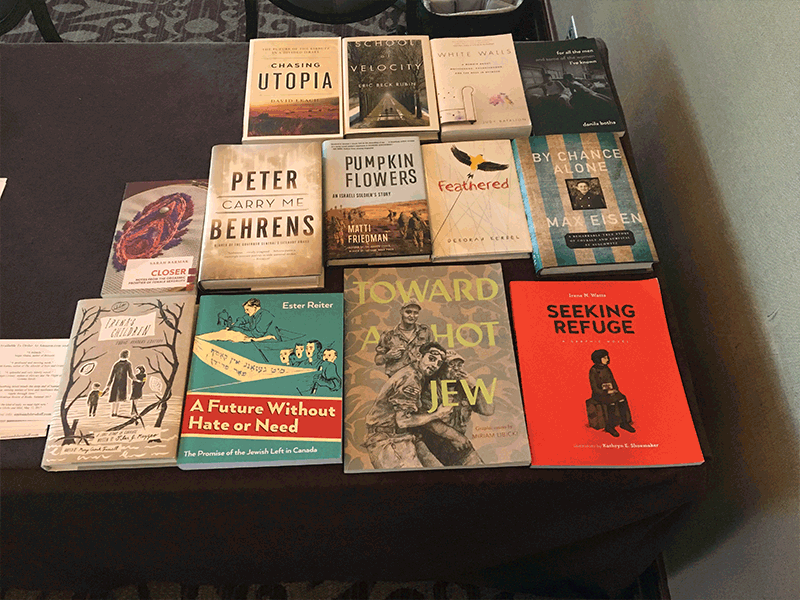Peter Behrens was among the winners of the Vine Awards for Canadian Jewish Literature announced by the Koffler Centre of the Arts on Oct. 3 at the Park Hyatt Hotel.
Behrens won in the fiction category for Carry Me. The prize includes a $10,000 award on behalf of Lillian and Norman Glowinsky Family Foundation.
Other winners were Miriam Libicki, Matti Friedman, Irene N. Watts and Kathryn E. Shoemaker.
The jury, featuring Ami Sands Brodoff, Bob Bossin and Cary Fagan, called Behrens a “master” and that, “this is a novel that could be, should be, read in a hundred years.”
In his acceptance speech, Behrens outlined his inspiration in an anecdote from his childhood. His father immigrated to Canada in 1934 from Frankfurt, however, in 1939, felt compelled to return to bring Behrens’ grandparents over to Canada as well. However, Behrens’ grandfather was reluctant to leave.
“He was one of those few people who still believed in Germany and still could not believe this monster [Hitler] would be allowed to continue,” said Behrens. “He was wrong, obviously.”
READ: LOVE STORY DEPICTS MORAL CRUMBLING OF PREWAR GERMANY
Behrens continued to explain that as his father was in Germany attempting to persuade the grandparents to come with him to Canada, his father received a telegram from a friend back in England urging him to leave Germany as fast as he could, which he did. Fifty years later, Behrens recalls being in the hospital as his father was on his deathbed.
“He was in a coma and he kept sitting up, wild-eyed, blue-eyed, crazy looking guy with white hair and coming out of the coma as if he was swimming out of a deep water and he’d look at me and say, ‘get my suitcase, we have to get to the station before it closes,’” says Behrens. “And I realized then that my dad was back in those moments in 1939 when he was trying to escape out of the country and that everything else in his life had fallen away.”
Although his book is fictional, Behrens said the novel is considerably inspired by his father’s complicated youth.
“I would not have written this book if I was not my father’s son. I couldn’t have written it.”
In the non-fiction category, Libicki was awarded the prize for her book, Toward a Hot Jew, a collection of essays and art.
For Libicki, the essays began as self-published zines she would sell at comic-cons. Her inspiration was mainly her journey in finding herself.
“I wrote these things and drew these things because they were something I needed to figure out for myself and my own identity and misfit questions.”
Although Libicki says there is growth in her book, she says her next project continues to explore identity, but this time, as a 30-year-old.
“I still think I’m really questioning and interrogating identity but I think it’s really changed…This is more about identity through choosing community and feeling like the identity I choose now is the one I’m going to have forever.”
Toronto-native, Matti Friedman, took home the history award for his book, Pumpkin Flowers.
Now living in Israel, Friedman began his career in the journalism industry, working for news outlets including the Jerusalem Report and Times of Israel, before he began writing books.
In his acceptance speech, Friedman says although he moved to Israel 22 years ago, he is much more aware now of how much his childhood in Toronto influenced him and his writing. Despite living in Israel, Friedman writes about being Canadian in his work, citing the plot of Pumpkin Flowers of when he went into Lebanon with his Canadian passport.
“I’ve traveled a long physical way and a long spiritual way from this city [Toronto] but the more time that passes, the more I realize how much my brain was formed here and how much I owe this place and this city.”
Friedman says that much of his work is an attempt for others to understand Israel as more than just a “caricature.”
“Very few people understand the country as a country so that’s what I’m trying to do. I’m trying to see Israel through an ideological lens…and I think that will help interest people in understanding the decisions that we make and why things look the way they look.”
The fourth prize, for the children’s and young adults category, was awarded to Irene N. Watts and Kathryn E. Shoemaker, for their graphic novel, Seeking Refuge.
This is their second graphic novel. Watts writes the text while Shoemaker draws the illustrations.
Although Watts says many people believe the stories she writes to be about herself, she says she has never written her own story but draws inspiration from her experiences and research.
“In 1938, I was seven years old and I went on the Kindertransport with my little suitcase by myself of course and two hundred other children and a head full of stories and I don’t think anybody dreamt that I would end up here,” says Watts.
The Vine Awards were originally established in 2004 as a tribute to Lillian Glowinsky’s parents, Helen and Stan Vine, and continue to celebrate the arts and literature in the Jewish community. The Vine Awards will return next year with an additional poetry category.
